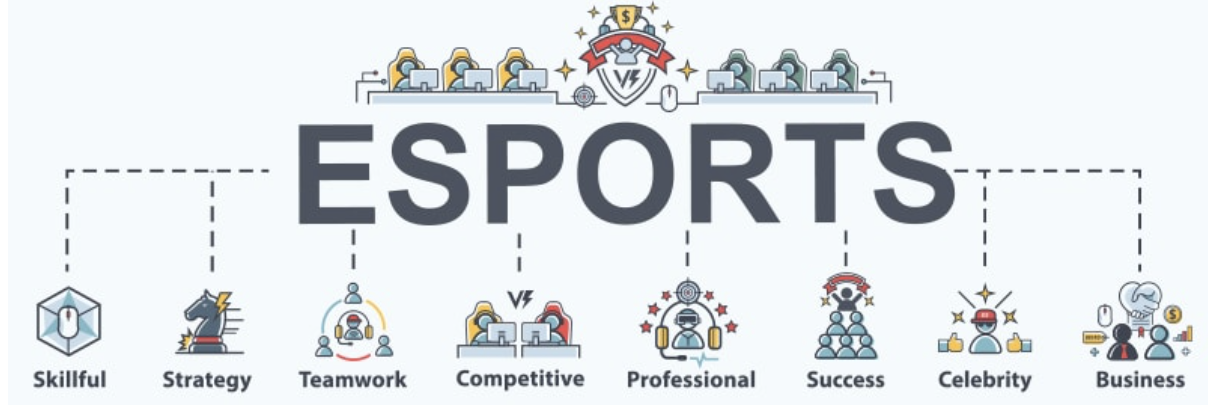Recognizing Esports as a Sport
Esports, short for electronic sports, has emerged as a global phenomenon. Captivating millions of fans and participants worldwide. In recent years, the debate on esports’ sport status gained momentum. With the rise of competitive gaming and the growth of esports clubs. Let’s explore the reasons behind recognizing esports as a sport. In this article, we will delve into the world of esports. Is rapid growth. And the arguments for granting it the status of a sport. We will consider the implications of this recognition. Including the potential benefits and challenges it brings to the table.
The Rise of Esports in India
India is no stranger to the esports craze. The country has witnessed a significant surge in esports aid. And viewership. Esports events in India have garnered large audiences. Both online and offline. Popular games like PUBG and Valorant have become cultural phenomena. And their competitive scenes are thriving.
One contributing factor is esports’ online convenience. The India 1xbet site has played a crucial role in providing a platform for esports enthusiasts. To bet on their favorite teams and players. This highlights the mainstream recognition of esports as a legitimate form of competition.
Defining Esports as a Sport
Before we discuss esports as a sport, let’s define “sport.” Sports have been physical activities that involve skill, strategy, and competition. They often require physical exertion and athleticism. However, this definition has evolved over time.
Esports, despite the absence of physicality, share core sports principles. Competitive video gaming involves skill, strategy, teamwork, and intense competition. Players train rigorously, develop strategies. And compete at the highest levels of play. In essence, esports is a mind sport that tests mental agility, reflexes, and decision-making prowess.
Arguments for Recognizing Esports as a Sport
1. Skill and Dedication.
Recognizing esports as a sport hinges on the immense skill and dedication it demands. Professional esports players undergo rigorous training, practice relentlessly. And consistently enhance their gameplay. Much like traditional athletes, they rely on quick reflexes. Sharp mental acuity. And the ability to excel under pressure.
2. Global Fame and Fanbase.
Esports has transcended geographical boundaries and has a truly global fanbase. Major esports events draw millions of global viewers. Matching traditional sports events in viewership and engagement. This global reputation is a testament to the legitimacy of esports as a sport.
3. Structured Clubs and Leagues.
Esports has developed a structured ecosystem with professional clubs, leagues, and tournaments. Teams like Team Liquid, Fnatic, and SK Telecom T1 are now household names. Akin to New York Yankees or Manchester United in traditional sports. These clubs invest significant resources in talent scouting, player development. And also fan engagement.
4. Economic Growth and Investment.
The esports industry has witnessed tremendous economic growth, with investments pouring in from various sectors. This growth includes sponsorships, advertising, merchandise sales, and media rights deals. Recognizing esports as a sport can further legitimize these investments. And ensure a sustainable future for the industry.
5. Inclusivity
Esports is known for its inclusivity, breaking down barriers that traditional sports face. Age, gender, and physical abilities are not limiting factors. Esports provides conveniences for people from diverse backgrounds. To compete on an equal playing field. Promoting diversity and inclusivity in the world of sports.
6. Pathways to Expertise.
Aspiring athletes dream of the NFL or NBA, while young gamers aspire to go pro in esports. Recognizing esports as a sport can provide clearer pathways to expertise. With more conveniences for talented people. To pursue their passion and make a living from it.
The Challenges of Recognizing Esports as a Sport
While the arguments in favor of recognizing esports as a sport are compelling. There are also challenges that must be addressed. These challenges include:
1. Perception and Stereotypes.
Many people still hold traditional views of sports. Associating them primarily with physical activity. Clearing perceptions and stereotypes is a hurdle esports must overcome for wider recognition.
2. Regulation and Governance.
Esports lacks a unified governing body like traditional sports. The diverse gaming landscape complicates regulation and governance. Creating a standardized esports framework is a significant effort.
3. Doping and Cheating.
Just as in traditional sports, doping and cheating can be issues in esports. Ensuring fair play and integrity within the industry is crucial for its long-term success. And recognition as a sport.
4. Physical Health Concerns.
Extended periods of gaming can lead to physical health concerns. Such as eye strain and repetitive strain injuries. Promoting healthy gaming habits and addressing these concerns is essential.
5. Integration into Education.
Esports is gaining ground in the educational sector. With universities offering scholarships for esports players. However, integrating esports into mainstream education systems remains a challenge.
Bridging the Gap: Cultural Acceptance
Cultural differences and attitudes toward esports vary across the globe. While esports may be widely embraced in some regions, it still faces skepticism or resistance in others. Bridging these cultural gaps and achieving universal acceptance. Is essential for esports to secure its place alongside traditional sports. It requires education, advocacy. And mutual efforts. To dispel and promote knowledge of the competitive gaming world.
A Unified Governance Framework
Regulation and governance represent a significant challenge for the esports industry. Unlike traditional sports with well-established governing bodies. Esports lacks a unified official framework. The landscape is fragmented. With different game publishers, clubs. And leagues setting their own rules and standards.
Standardizing governance is crucial for esports integrity. It would help prevent issues such as match-fixing and doping. Fostering trust among players, teams, and fans. Several initiatives are underway to address this challenge. Including the formation of clubs like the Esports Integrity Commission (ESIC).
The Pursuit of Healthy Gaming
Esports’ fame has brought attention to potential health concerns associated with prolonged gaming sessions. Gamers are susceptible to physical ailments like eye strain. Carpal tunnel syndrome. And sedentary lifestyle-related health issues.
To address these concerns, both persons and clubs within the esports industry are promoting healthier gaming habits. Regular breaks, ergonomic setups, and physical exercise routines. They are being encouraged to mitigate the risks related with extensive gameplay. Esports values balancing passion with well-being.
Education and Integration
Esports is increasingly finding a place in the cultural sector. Academies and colleges around the world are offering esports scholarships. Forming teams. And providing academic programs related to esports management, game development, and esports marketing.
The integration of esports into mainstream education systems remains a challenge.
A Promising Future
Despite the challenges ahead, the future looks promising for esports. The industry’s rapid growth and global appeal indicate that it is more than just a passing trend. With the right approach and support from stakeholders. Esports can successfully secure its place alongside traditional sports in the global sporting landscape.
Recognition as a legitimate sport validates professional esports players’ dedication and skill.
It also open up new opportunities for aspiring talents. Scholarships, sponsorships, and career prospects would become more accessible. Further fueling the growth of the esports ecosystem.
The recognition of esports would bring greater attention to its positive aspects. Such as teamwork, strategic thinking. And problem-solving. It can be valuable skills both in and outside the gaming world. Esports can serve as a bridge between generations. Appealing to a broad and diverse audience. Including young fans and the ever-growing esports community.
Conclusion
The debate surrounding the recognition of esports as a sport is gaining traction for valid reasons. Esports showcases skill, dedication, and competition on a global scale. Similar to traditional sports. It has a massive fanbase, structured clubs. And a booming economy. Recognizing esports as a sport can further legitimize the industry. And provide more space for talented people.
Addressing stereotypes, regulation, and health concerns. Is crucial for a smooth transition into the world of recognized sports.
The esports industry continues to evolve. It is essential for stakeholders, including game publishers, clubs, players, and fans. For what? To work together to shape its future positively.
The journey to officially recognizing esports as a sport is ongoing. It’s intriguing to watch how this dynamic industry evolves in the years ahead. Whether you view esports as a sport or not. There is no denying its impact on the world of past time and competition. With the right approach, esports can secure its place in the global sporting landscape.


